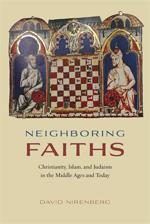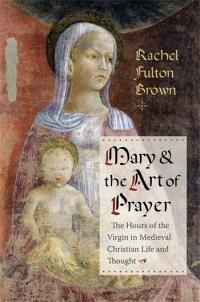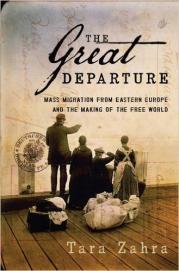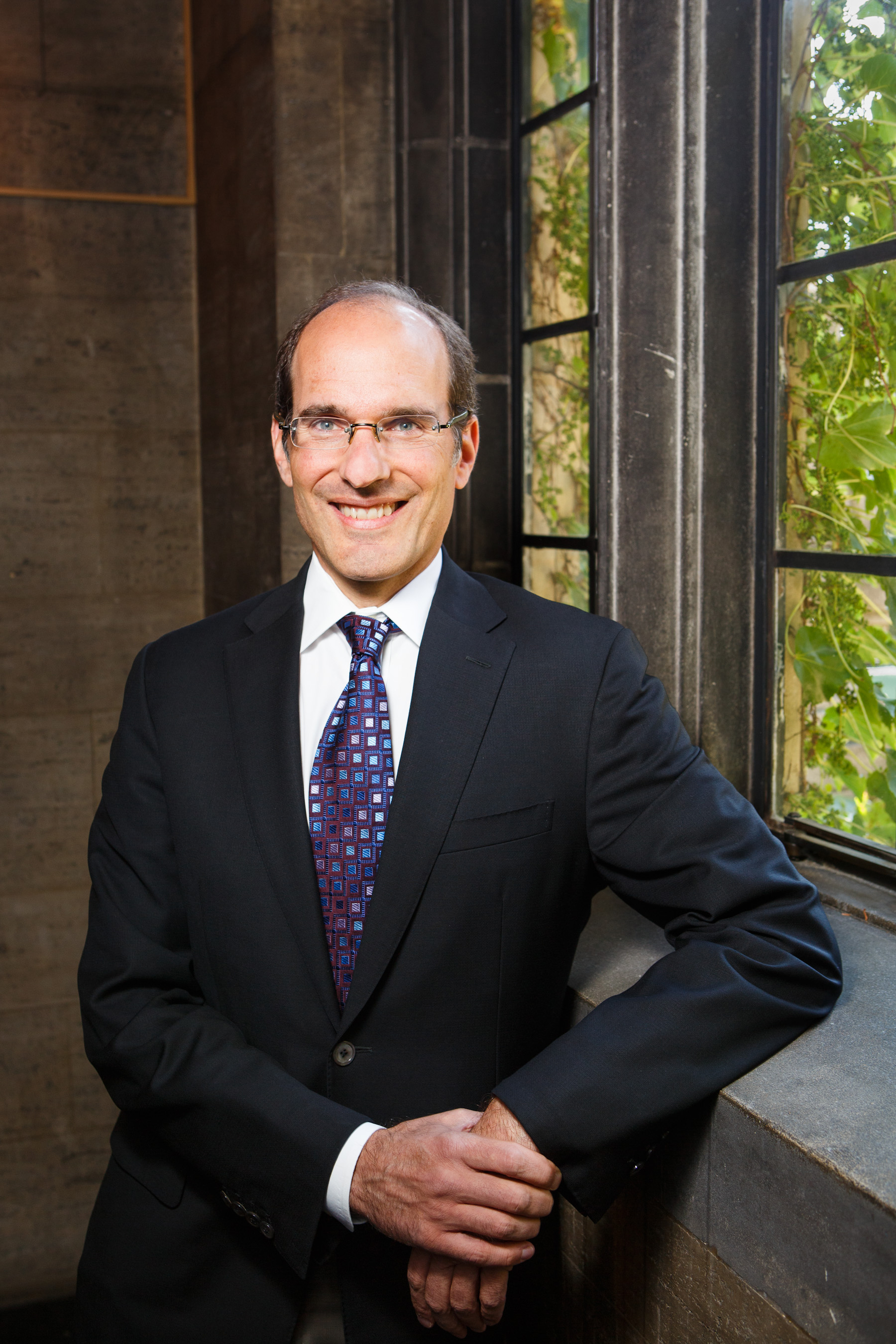
Princeton University, PhD '92
BIOGRAPHY
I have spent most of my intellectual life shuttling between the micro and the macro, trying to understand how life and ideas shape and are shaped by each other. One stream of my work has approached these questions through religion, focusing on the ways in which Jewish, Christian, and Islamic cultures constitute themselves by interrelating with or thinking about each other. My first book, Communities of Violence: Persecution of Minorities in the Middle Ages, studied social interaction between the three groups within the context of Spain and France in order to understand the role of violence in shaping the possibilities for coexistence. In later projects I explored the work that “Judaism,” “Christianity,” and “Islam” do as figures in each other’s thought. One product of that approach, focused on art history, was (jointly with Herb Kessler) Judaism and Christian Art: Aesthetic Anxieties from the Catacombs to Colonialism (2011). In Anti-Judaism: The Western Tradition (2013), I attempted to apply the methodology to a very longue durée, studying the work done by pagan, Christian, Muslim, and secular thinking about Jews and Judaism in the history of ideas. More or less simultaneously in Neighboring Faiths: Christianity, Islam, and Judaism Medieval and Modern (2014), I tried to bring the social into conversation with the hermeneutic, in order to show how, in multireligious societies, interactions between lived experiences and conceptual categories shape how adherents of all three religions perceive themselves and each other. Then in Aesthetic Theology and Its Enemies: Judaism in Christian Painting, Poetry, and Politics (2015), I focused on how thinking about Judaism shaped the ways in which Christian cultures could imagine the possibilities and limits of community and communication.
Beginning with my book Anti-Judaism, which stretched from ancient Egypt to the twentieth century in order to try to understand the work done by a family of concepts across history, I have tried to cultivate a new approach to the “long history” of ideas. My most recent book, Uncountable: A Philosophical History of Number and Humanity from Antiquity to the Present, written in collaboration with Ricardo Nirenberg (a mathematician who happens also to be my father), follows this path as well. It explores the long history of the various types of sameness that underpin the claims of different forms of knowledge (from poetry and dreams, to monotheism, math, and physics), using these to think critically about the powers and the limits of the sciences and the humanities. I am now at work on the long history of yet another family of concepts, namely the inter-connected history of race and religion from the Neolithic to the present.
Recent Research / Recent Publications
Coauthored with Ricardo Nirenberg. Uncountable: A Philosophical History of Number and Humanity from Antiquity to the Present. Chicago, IL: University of Chicago Press, 2021.
Communities of Violence: Persecution of Minorities in the Middle Ages. Princeton, NJ: Princeton University Press, twentieth-anniversary edition with new preface, 2016.
Aesthetic Theology and Its Enemies: Judaism in Christian Painting, Poetry, and Politics. Lebanon, NH: University Press of New England, 2015.
Neighboring Faiths: Christianity, Islam, and Judaism in the Middle Ages and Today. Chicago, IL: University of Chicago Press, 2014.
- Review of Neighboring Faiths and Anti-Judaism by Carlos Fraenkel, "We Hear and We Disobey," London Review of Books (May 21, 2015): 31–34.
Anti-Judaism: The Western Tradition. New York: W.W. Norton, 2013.
- Review by Michael Walzer, "Imaginary Jews," New York Review of Books (Mar. 20, 2014)
- Review by Anthony Grafton, "The Strange History of Antisemitism in Western Culture," New Republic (Oct. 11, 2013)
Discusses book on US Holocaust Memorial Museum podcast
Awarded Ralph Waldo Emerson Award
Communities of Violence: Persecution of Minorities in the Middle Ages. Princeton, NJ: Princeton University Press, 1996; paperback edition, 1998. Spanish translation: Comunidades de Violencia: Persecución de minorías en la edad media. Peninsula Editorial, 2001; French translation: Violence et minorités au Moyen Age. Paris: Presses Universitaires de France, 2001.
- 2000 John Nicholas Brown Prize, Medieval Academy of America
- 1998 Herbert Baxter Adams Prize, American Historical Association
- 1998 Best First Book in Iberian History, Society for Spanish and Portuguese Historical Studies
- 1996 Premio del Rey Prize, American Historical Association
- Coedited with María Elena Martínez and Max Hering Torres. Race and Blood in Spain and Colonial Latin America. LIT-Verlag, 2012.
- Coedited with Herbert Kessler. Judaism and Christian Art: Aesthetic Anxieties from the Catacombs to Colonialism. Philadelphia: University of Pennsylvania Press, 2011.
- "The Impresarios of Trent: The Long and Frightening History of the Blood Libel." Nation (November 16, 2020).
- "What Is Islam? (What Is Christianity? What Is Judaism?)." Raritan 35 (Fall 2016): 1–14.
- "Love." In What Reason Promises: Essays on Reason, Nature, and History, edited by Wendy Doniger, Peter Galison, and Susan Neiman, 46–54. Berlin: De Gruyter, 2016.
- With Leonardo Capezzone. "Religions of Love: Judaism, Christianity, Islam." In The Oxford Handbook of the Abrahamic Religions, edited by Adam Silverstein and Guy G. Stroumsa, 518–535. Oxford: Oxford University Press, 2015.
- "Power and Piety: Is the Promotion of Violence Inherent to Any Religion?" Nation (Apr. 29, 2015).
- "Posthumous Love in Judaism." In Love After Death: Concepts of Posthumous Love in Medieval and Early Modern Europe, edited by Bernhard Jussen and Ramie Targoff, 55–70. Berlin: De Gruyter, 2015.
- "'Judaism' as Political Concept: Toward a Critique of Political Theology." Representations 128 (Fall 2014): 1–29.
- "'Judaism,' 'Islam,' and the Dangers of Knowledge in Christian Culture, with Special Attention to the Case of King Alfonso X, 'the Wise,' of Castile." In Mapping Knowledge: Cross-Pollination in Late Antiquity and the Middle Ages. Arabica Veritas, vol. I, edited by C. Burnett and P. Mantas-España, 253–76. Cordoba: Oriens Academica, 2014.
- "Sibling Rivalries, Scriptural Communities: What Medieval History Can and Cannot Teach Us about Relations between Judaism, Christianity, and Islam." In Faithful Narratives, edited by Andrea Sterk and Nina Caputo, 63–82. Ithaca, NY: Cornell University Press, 2014.
- "Christian Love, Jewish 'Privacy,' and Medieval Kingship." In Center and Periphery: Studies on Power in the Medieval World, edited by Katherine L. Jansen, G. Geltner, and Anne E. Lester, 25–37. Leiden: Brill, 2013.
- Coauthored with Ricardo Nirenberg. "Badiou's Number: A Critique of Mathematical Ontology." Critical Inquiry 37, no. 4 (2011): 583–614. Response by Alain Badiou and a reply by us, "Critical Response." Critical Inquiry 38 (2012): 362–87.
- "From Cairo to Cordoba." Nation (June 1, 2011).
- "When Philosophy Mattered." New Republic (Feb. 3, 2011): 39–43.
- "Shakespeare's Jewish Questions." Renaissance Drama (2010): 77–113.
- "Double Game: Maimonides in his World." London Review of Books (Sept. 23, 2010): 31–32.
- "Anti-Zionist Demography." Dissent (Spr. 2010): 103–9.
- Interviewed on anti-Semitism for The New Yorker, 2020
- Writes op-ed on Facebook's hate speech policy, Tablet Magazine, 2019
- Appointed interim dean of the Divinity School, 2018
- Appointed executive vice provost
- Quoted in an Atlantic article on Charlottesville and anti-Semitism
- Awarded 2017 Historikerpreis der Stadt Münsters for his body of work
- Delivers the University of Chicago 527th Convocation Address [video, 12 minutes]
- Awarded Doctor of Philosophy, Honoris Causa, University of Haifa, 2016
- Elected to the American Academy of Arts and Sciences
- Publishes Aesthetic Theology and Its Enemies: Judaism in Christian Painting, Poetry, and Politics (Brandeis, 2015)
- Delivers 2015 Harper Lecture on Religion and Violence [video, 79 minutes]
- Publishes Neighboring Faiths: Christianity, Islam, and Judaism in the Middle Ages and Today (Chicago, 2014).
- Appointed a Fellow of the Medieval Academy of America
- Appointed Dean of the Social Sciences Division
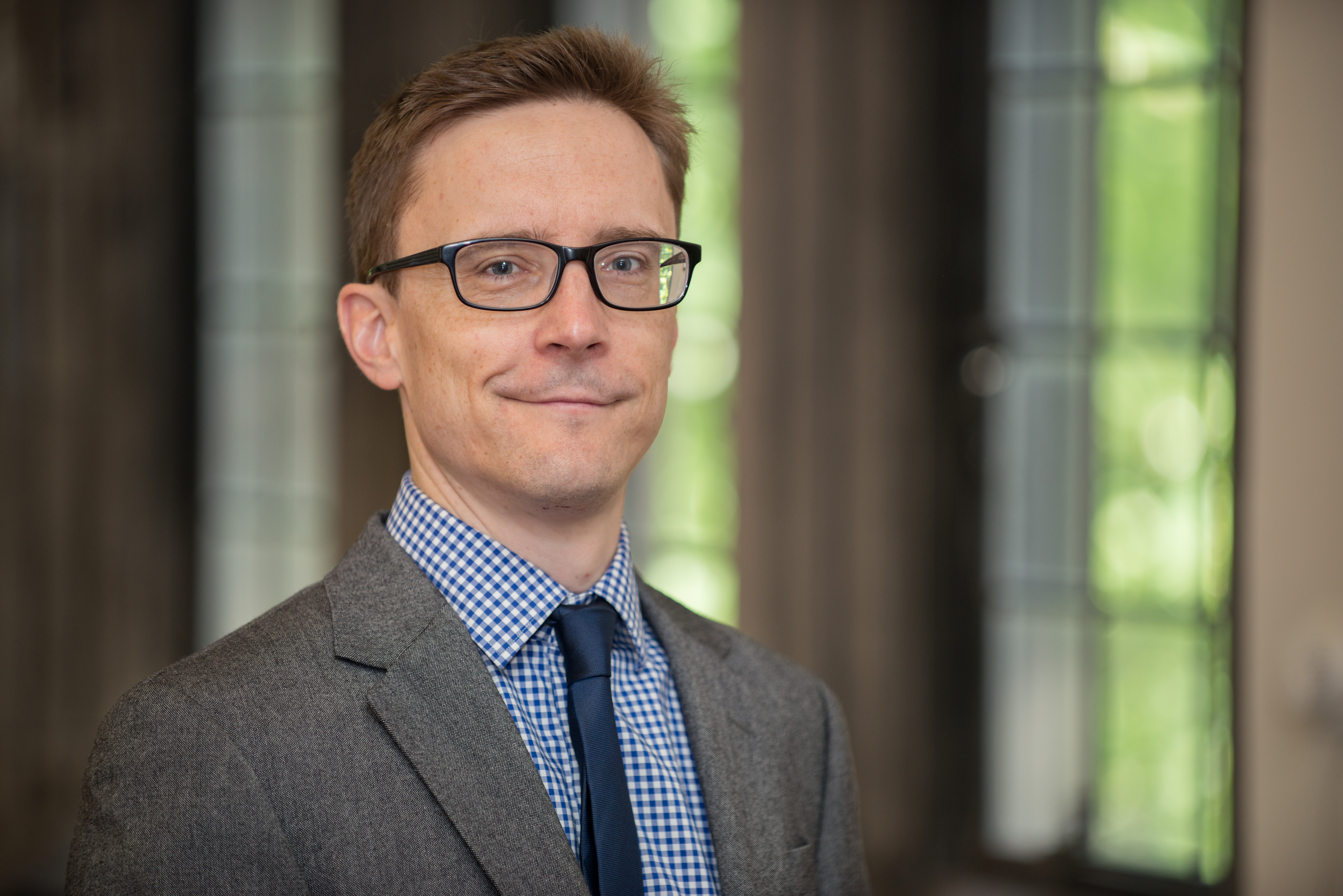
University of Cambridge, PhD '06
BIOGRAPHY
I am an historian of modern social and political thought. I focus in particular on American and British traditions of social thought. My earliest research examined how theories of knowledge drove important changes in the human sciences during the twentieth century. Much of this work found its way into my first book, Working Knowledge: Making the Human Sciences from Parsons to Kuhn (Cambridge, MA: Harvard University Press, 2012), which was awarded the Gladstone Prize by the Royal Historical Society, UK.
I am currently writing a book about the relations between economics and social thought from the late nineteenth century to the present. The aim of this project is to explain the ways in which modern economics has shaped – whether by attraction or repulsion – the development of social theory and political thought. The major topics addressed by the book include the diffusion of rational choice theory across the human sciences, and the reception of Enlightenment thought about politics and markets.
I also work on issues in the history of modern philosophy, American history and the history of the Cold War.
Before joining the University of Chicago, I held positions at the University of Cambridge (2011-2017) and Queen Mary, University of London (2007-2011).
Recent Research / Recent Publications
-
ed., with Gary Gerstle, States of Exception in American History (Chicago: University of Chicago Press, 2020)
-
ed., with James T. Kloppenberg et al, The Worlds of American Intellectual History (New York: Oxford University Press, 2016)
-
ed., with Duncan Bell, Uncertain Empire: American History and the Idea of the Cold War (New York: Oxford University Press, 2012)
-
Working Knowledge: Making the Human Sciences from Parsons to Kuhn (Cambridge, MA: Harvard University Press, 2012)
-
'The Many Faces of Analytic Philosophy' in The Cambridge History of Modern European Thought, ed. Warren Breckman and Peter Gordon (Cambridge: Cambridge University Press, 2019), 176-199
-
'The Intensification of Social Forms: Economy and Culture in the Thought of Clifford Geertz', Critical Historical Studies (Fall 2018): 237-266
-
'Pain, Analytical Philosophy, and American Intellectual History', in The Worlds of American Intellectual History, ed. Joel Isaac, James T. Kloppenberg, Michael O'Brien, and Jennifer Ratner-Rosenhagen (New York: Oxford University Press, 2016), 202-217
-
'Donald Davidson and the Analytic Revolution in American Philosophy, 1940-1970', Historical Journal 56 (2013), 757-79
-
'Missing Links: W. V. Quine, the Making of "Two Dogmas," and the Analytic Roots of Postanalytic Philosophy', History of European Ideas 37 (2011), 267-79
-
'Tool Shock: Technique and Epistemology in the Postwar Social Sciences', History of Political Economy 42 (Annual Supplement 2010), 133-64
-
'Theorist at Work: Talcott Parsons and the Carnegie Project on Theory, 1949-1951', Journal of the History of Ideas 71 (2010), 287-311
-
'Tangled Loops: Theory, History and the Human Sciences in Modern America', Modern Intellectual History 6 (2009), 397-424
-
'The Human Sciences in Cold War America', Historical Journal 50 (2007), 725-46
-
'W. V. Quine and the Origins of Analytic Philosophy in the United States', Modern Intellectual History 2 (2005), 205-34
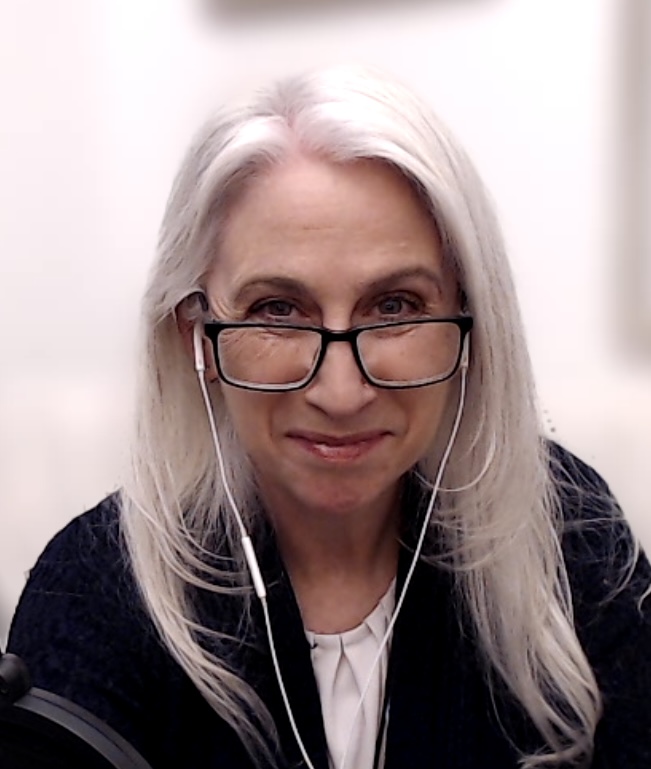
Columbia University, PhD '94
BIOGRAPHY
My research and teaching focus on the intellectual and cultural history of Europe in the Middle Ages, with particular emphasis on the history of Christianity in the Latin West. I also offer courses on the history of European civilization and the works of J. R. R. Tolkien. My ongoing research addresses the interplay between intellect and empathy in the practical development of a discipline of prayer. My immediate purpose is to find a way to describe prayer as a practical art, that is, as a practice that takes skill and uses particular tools. My ultimate goal is to develop an understanding of the meaning and importance of worship as itself a creative act.
In my research I have paid special attention to the medieval devotion to the Virgin Mary. Why? Because Mary is more than just the Virgin whom Christians believe gave birth to the Son of God. She is the key that unlocks the medieval era itself. As I argue in the proposal for the Companion to the Christian Tradition that I have been invited to edit for Brill, to understand the place of Mary in medieval Christian devotion, it is not enough to study her as an art historian or a musicologist or a literary scholar or an historian or a theologian. To understand Mary as medieval Christians imagined her, one has to understand everything. She is there in the art and the architecture and the music. She is there in the literature and the liturgy and the liberal arts. She is there in the most elevated expressions of human imagination and in the humblest prayers for help. She is there in the politics and in the ideals of marriage, in battle cries and in pleas for mercy for the oppressed. Medieval Christianity is inconceivable without her, and yet, since the Reformation, Christians have struggled to explain why she should have been there at all. “All the steam in the world,” Bostonian Henry Adams (d. 1918) once opined, “could not, like the Virgin, build Chartres.” He might better have said, “build Christendom.”
In my first book, From Judgment to Passion: Devotion to Christ and the Virgin Mary, 800–1200 (Columbia, 2002), my primary goal was to find a way to make a hitherto obscure tradition of scriptural commentary readable as a form of devotion. For my second book, Mary and the Art of Prayer: The Hours of the Virgin in Medieval Christian Life and Thought (Columbia, 2017), I wanted to take this exercise further and find a way to help modern academic and lay readers imagine seeing the world as a medieval Christian might, from within, while at the same time making clear what it took for medieval Christians to construct that worldview. My sources for this second project were similar to those that I used for my first book: liturgical chants and prayers, commentaries on scripture, stories told about the miracles of the Virgin, sculpted and painted images, all situated in the biographies of their authors and the larger transformations of the society and tradition in which they were produced. My question was likewise similar: what did it mean for medieval Christians to pray to the Virgin Mary as the Mother of God and to Jesus Christ as her Son? But my goal was somewhat more ambitious: not just to show modern readers how medieval Christians talked about Mary and her Son, but to give modern readers some sense of what it was like to see the world through this devotional and theological frame.
I apply a similar methodology in my teaching. Why do I teach medieval European history? Because story matters. More particularly: because the stories with which we fill our imaginations shape our souls as well as our actions in the world. All of the courses that I teach begin from this premise: that the study of history is valuable not just for the skills that it imparts, but also for its content because it is the content of its stories that gives shape to our understanding of ourselves and our world. The humanities as a whole have become heavily invested in the intersection of identity and practice over the past thirty or so years, but history has always been about identity—about our particular identities as individuals and about our shared identity as human beings. It is the practice of telling ourselves, as human beings, who we are.
In all my courses, I focus on helping students become aware of the way in which stories frame the way they think about the past, while at the same time encouraging them to read the sources I assign for the questions that they were originally intended to answer; that is, to look for the frames within which they were originally written. In my two-quarter section of Chicago’s core sequence “History of European Civilization,” this exercise takes the form of particular questions that I have the students ask about each text that we read: What does the author tell us (explicitly or implicitly) about why he or she was writing? Why was the author’s subject so important that he or she considered it worth writing about? What does the author’s interest in the subject tell us about the historical circumstances in which he or she was writing? In my undergraduate and graduate courses in medieval history and the history of Christianity, my methodology is the same, if less explicit: to think ourselves inside the frame(s) from within which our sources were written so as to attempt to understand why their authors made the arguments that they did in the way that they did and thereby become aware of the limitations of our own frames.
Such an exercise is necessarily always contingent and provisional, subject to revision as we read further into the sources, become aware of new elements in the story, and encounter assumptions for which we have no interpretive frame. My own teacher Caroline Walker Bynum coined the phrase “history in the comic mode” to describe this process. As Bruce Holsinger and I explained in the afterword to the Festschrift that we co-edited in her honor,
History in the comic mode challenges us as scholars (and storytellers) to recognize not only our endings, that is, our answers—carefully articulated on the basis of a proper weighting of the evidence in context, balanced against all the slippages and silences of the sources themselves—as constructions, but also our beginnings; the punch line is only funny, the answer is only satisfying, if we accept the premise of the joke...
As with all comedy, such an openness [to our own contingency] involves risks—we cannot be sure of our audience’s response any more than we can of our answers—and yet, we would insist, to refuse to take these risks out of otherwise commendable concerns for objectivity or methodological applicability, never mind contemporary political urgency, is less a mark of serious scholarly rigor than it is a tragic refusal to join in the fun.
I want my students to join in the fun, even as it challenges them to take risks, even as it threatens to overturn everything they have previously learned about the past—or about themselves.
Recent Research / Recent Publications
La Vierge Marie et le “Cantique des cantiques” au Moyen Âge. French translation by Jésus Marie Joseph. Honoré Champion, 2022.
Mary and the Art of Prayer: The Hours of the Virgin in Medieval Christian Life and Thought. New York: Columbia University Press, 2017.
Mary in the Scriptures: The Unexpurgated Tradition. The Theotokos Lectures in Theology 7. Milwaukee: Marquette University Press, 2014.
“Mary in the Scriptures as Container and Way: Henry Adams and the Virgin of Chartres.” In Performing the Sacred: Christian Representation and the Arts, ed. Carla M. Bino and Corinna Ricasoli, pp. 74-86. Leiden: Brill, 2023.
“Prayer.” In The Oxford Handbook of Christian Monasticism, ed. Bernice M. Kaczynski, pp. 317-32. Oxford: Oxford University Press, 2020.
“Mary and the Body of God: Servasanctus of Faenza and the Psalter of Creaton.” In Medieval Franciscan Approaches to the Virgin Mary, ed. Steven J. McMichael. Leiden: E.J. Brill, 2019.
"Mary in Medieval Prayer: The Hours of the Virgin." In The Oxford Handbook of Mary, ed. Chris Maunder, pp. 338-51. Oxford: Oxford University Press, 2019.
"Exegesis, Mimesis, and the Voice of Christ in Francis of Assisi's Office of the Passion." The Mediaeval Journal 4, no. 2 (2014): 39–62.
"What's in a Psalm? British Library, MS Arundel 60 and the Stuff of Prayer." In Rome and Religion in the Medieval World: Studies in Honor of Thomas F.X. Noble, edited by Valerie L. Garver and Owen M. Phelan, 235–52. Farnham, Surrey: Ashgate, 2014.
"Hildegard of Bingen’s Theology of Revelation." In From Knowledge to Beatitude: St. Victor, Twelfth-Century Scholars, and Beyond. Essays in Honor of Grover A. Zinn, Jr., edited by E. Ann Matter and Lesley Smith. Notre Dame: University of Notre Dame Press, 2013.
"Anselm and Praying with the Saints." In Experiments in Empathy: The Middle Ages, edited by Karl F. Morrison and Rudolph M. Bell. Turnhout: Brepols, 2013.
"Oratio." In The Cambridge Companion to Christian Mysticism, edited by Patricia Z. Beckman and Amy Hollywood. Cambridge: Cambridge University Press, 2012.
"My Psalter, My Self, or How to Get a Grip on the Office according to Jan Mombaer (d.c. 1501)." Spiritus: A Journal of Christian Spirituality 12, no. 1 (2012): 76–106.
“Three-in-One: Making God in Twelfth-Century Liturgy, Theology and Devotion.” In European Transformations, 950–1200, edited by Thomas F. X. Noble and John Van Engen, 468–97. Notre Dame: University of Notre Dame Press, 2012.
"Mary." In Christianity in Western Europe c. 1000–c.1500, edited by Miri Rubin and Walter Simons, 283–96. Cambridge: Cambridge University Press, 2009.
"Praying by Numbers." Studies in Medieval and Renaissance History, 3rd series 4 (2007): 195–250.
History in the Comic Mode: Medieval Communities and the Matter of Person, coedited with Bruce Holsinger. New York: Columbia University Press, 2007.
"Praying with Anselm at Admont: A Meditation on Practice." Speculum 81, no. 3 (July 2006): 700–733.
"'Taste and See That the Lord is Sweet' (Ps. 33:9): The Flavor of God in the Monastic West." The Journal of Religion 86, no. 2 (April 2006): 169–204.
"The Virgin in the Garden, or Why Flowers Make Better Prayers." Spiritus: A Journal of Christian Spirituality 4 (Spring 2004): 1–23.
From Judgment to Passion: Devotion to Christ and the Virgin Mary, 800–1200. New York: Columbia University Press, 2002.
-
Journal of the History of Ideas' Morris D. Forkosch Prize for the best book in intellectual history published in 2002
-
2006 John Nicholas Brown Prize by the Medieval Academy of America
"'Quae est ista quae ascendit sicut aurora consurgens?': The Song of Songs as the Historia for the Office of the Assumption." Mediaeval Studies 60 (1998): 55–122.
"Mimetic Devotion, Marian Exegesis, and the Historical Sense of the Song of Songs." Viator 27 (1996): 86–116.
-
Dr. Fulton Brown's Tolkien Class Celebrated as a "Favorite UChicago Course"
-
Interviewed about Draco Alchemicus on Bounding Into Comics
-
Discusses Holy Fools in film, Fox Valley Film Critics, February 2020 [video, 29 mins]
-
"Stephen McInerney speaks with Rachel Fulton Brown," The Ramsay Centre Podcast, August 19, 2019
-
"Reclaiming the Middle Ages from Contemporary Politics," The Australian, August 10, 2019
-
Delivers talk, "Is Academia Good for the Soul?," Society For Academic Freedom and Scholarship, August 2019 [video, 76 mins]
-
Delivers the first Chris and John Furedy Lecture, Society for Academic Freedom and Society, Canada, May 3, 2019 [video, 79 mins]
-
"Episode 1407: Does Study of the Middle Ages Have a 'White Supremacy' Problem,” The Tom Woods Show, May 16, 2019
-
"In the Academic Sandbox: A skirmish in Medieval Studies," First Things, June 2019
-
"Medieval Scholars Joust With White Nationalists. And One Another," New York Times, May 5, 2019
-
"It's Her Cathedral," Catholic Herald, Apr. 18, 2019
-
"Fire in the Cathedral," First Things, Apr. 17, 2019
-
"How the Christchurch Shooter Seduced the Media With His Evil," American Greatness, Mar. 18, 2019
-
"One Gutsy Medievalist," National Review, Sept. 14, 2018
-
Delivers talk, "Training the Soul in Virtue: Lessons from the West," National Association of Scholars conference [video, 38 mins]
-
Publishes Mary and the Art of Prayer: The Hours of the Virgin in Medieval Christian Life and Thought (Columbia, 2017)

Princeton University, PhD '95
BIOGRAPHY
I am a professor in History, the College, and the Law School. My most recent book, White Fright: The Sexual Panic at the Heart of America's Racist History (Basic Book, 2020), concerns race, sex, and the civil rights movement from emancipation to the present. My next most recent book is Building the American Republic, Volume 2: A Narrative History From 1877 (Chicago, 2018). Both volumes are free in e-book form.
My work has revolved around the relationship between race, sex, and politics in the post-Emancipation South. My first book, Before Jim Crow: The Politics of Race in Postemancipation Virginia (North Carolina, 2000), analyzed the conditions that facilitated and, ultimately, undid interracial democracy in the post–Civil War South. An edited collection with Glenda E. Gilmore and Bryant Simon, Jumpin' Jim Crow: Southern Politics from Civil War to Civil Rights (Princeton, 2000), continued the theme of African American resistance to white domination from Reconstruction through the 1950s. A third book, The Age of Jim Crow: A Norton Documentary History (Norton, 2008), examines the creation and dissolution of legal segregation in America through primary sources.
My awards include fellowships from the American Council of Learned Societies, the American Academy in Berlin, the Alphonse Fletcher Foundation, and the John Simon Guggenheim Memorial Foundation.
Recent Research / Recent Publications
- White Fright: The Sexual Panic at the Heart of America's Racist History. New York: Basic Book, 2020.
- Building the American Republic, Volume 2: A Narrative History from 1877. Chicago: University of Chicago, 2018.
- "The Theology of Unionism and Anti-Unionism." Labor: Studies in Working-Class History of the Americas 14, no. 1 (Mar. 2017): 83–85.
- Senior editor for legal history, Oxford Research Encyclopedias: American History, edited by Jon Butler. Oxford: Oxford University Press, 2013–present.
- "Is Marriage a Civil Right? The Politics of Intimacy in the Jim Crow Era." In The Folly of Jim Crow: Rethinking the Segregated South, edited by Stephanie Cole and Natalie J. Ring, 176–208. College Station: Texas A&M Press, 2012.
- "The Civil Rights Movement in the South." In Speaking Out With Many Voices: Documenting American Activism in the 1960s and 1970s, edited by Heather Ann Thompson. Upper Saddle River, NJ: Prentiss Hall, 2008.
- "Fighting Hitler and Jim Crow: African Americans and World War II." The Berlin Journal (Fall 2005): 27–30.
- "The Theology of Massive Resistance." In Massive Resistance, dited by Clive Webb, 151–80. New York: Oxford University Press, 2005.
- "Sex, Segregation, and the Sacred After Brown." Journal of American History 91, no. 1 (June 2004): 119–44.
- "The Congress and White Supremacy, 1860s-1920s." In The American Congress: The Building of Democracy, edited by Julian E. Zelizer, 250–67. Boston: Houghton-Mifflin, 2004.
- "The Sexual Politics of Race in WWII America." In Mobilizing the Movement, edited by Kevin Kruse and Stephen Tuck. New York: Oxford University Press, 2011.Before Jim Crow: The Politics of Race in Post-Emancipation Virginia. Chapel Hill: University of North Carolina Press, 2000.
- "The Limits of Liberalism in the New South: The Politics of Race, Sex, and Patronage in Virginia" and "Introduction." In Jumpin' Jim Crow: Southern Politics from Civil War to Civil Rights, edited by Jane Dailey, Glenda Gilmore, and Bryant Simon, 3-6, 88–114. Princeton, NJ: Princeton University Press, 2000.
- "Deference and Violence in the Postbellum Urban South: Manners and Massacres in Danville, Virginia." Journal of Southern History 63 (August 1997): 53–90.
- Laura Kipnis's Unwanted Advances: Sexual Paranoia Comes to Campus, Christian Century (Oct. 9, 2017).
- Timothy B. Tyson's Blood Done Sign My Name. Chicago Tribune (May 30, 2004).
- Steven Hahn's A Nation Under Our Feet. Chicago Tribune (February 22, 2004).
- "The Last Time We Fought a Preemptive War in the Middle East." Huffington Post (Dec. 1, 2017).
- "Gerrymandering Is a Threat to Our Republic." Huffington Post (Oct. 3, 2017).
- "Remembering our KKK Past." Huffington Post (Sept. 12, 2017).
- "The Confederate General Who Was Erased from History." Huffington Post (Aug. 21, 2017).
- Discusses the American South's geographic boundaries with Business Insider
- Published Building the American Republic, Volume 2: A Narrative History from 1877
- Discusses Confederate Statues on NPR with James Grossman
- Named an OAH Distinguished Lecturer
- Discusses Presidential Primaries with Robin Young on Public Radio [audio, 9 mins.]
- Delivers Constitution Day Lecture on "Sex, Race, and the 14th Amendment" at Carthage College, Wisconsin [video, 86 mins.]
- "Obama's Omission." Chicago Tribune (July 30, 2008).
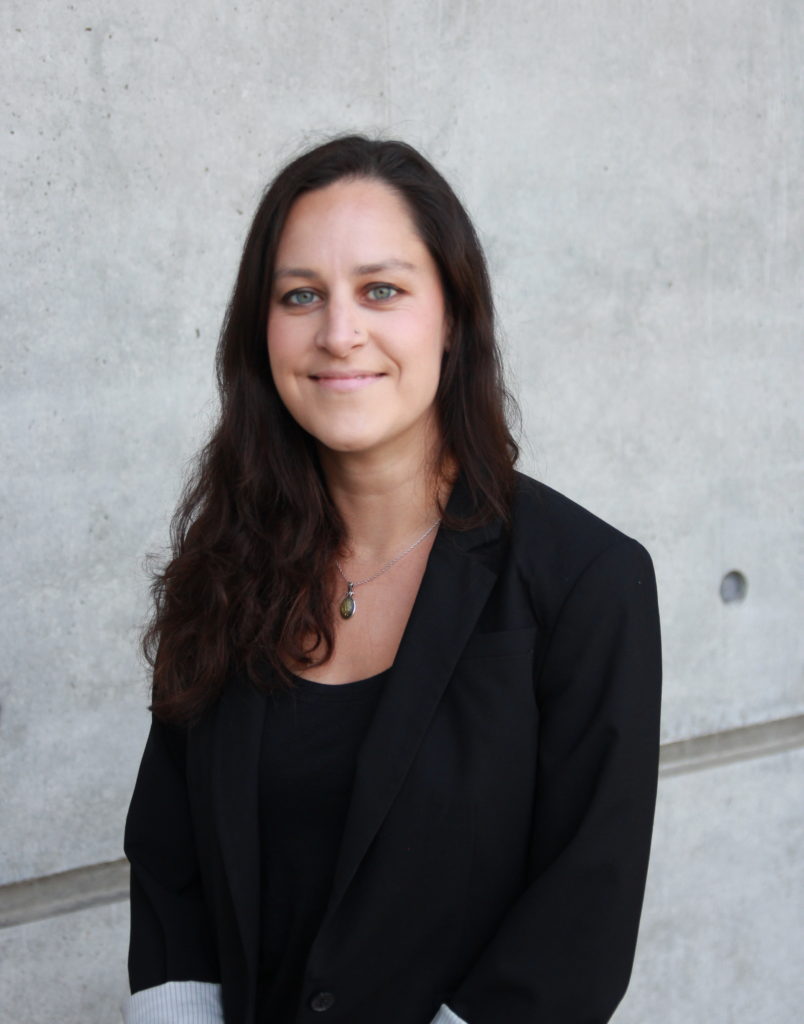
University of Oxford, DPhil '15
BIOGRAPHY
Elizabeth Chatterjee is a historian of energy and the environment, with a focus on India from 1900 to the present. Her research explores how non-Western energy histories disrupt conventional understandings of capitalist development and the social dynamics of climate change.
Chatterjee’s first book manuscript, Electric Democracy: An Energy History of India from Colonialism to Climate Change (under contract with the University of Chicago Press), traces the flows of electricity to provide an energy-centered history of India’s transforming political economy since the late colonial period. In so doing, it seeks to trace the very different dynamics underlying the later, Asian-centric phase of the Great Acceleration in human impacts on the planet. In place of the conventional emphasis on North Atlantic industrialists and private multinationals, it locates the postcolonial state and popular pressures for cheap energy at the heart of our contemporary environmental predicament.
Chatterjee’s second book-length project will provide a novel perspective on the worldwide environmental and energy crisis of the early 1970s as seen from the oil-importing global South, experimenting with how historians might deploy the multisystemic lens of Earth System Science as a methodological approach. She is exploring the links between this crisis and India’s turn to both authoritarianism and fossil fuels during this decade. At the same time, she continues to work on a wide variety of other topics in energy history, including the “infrastructural turn” in environmental history, dams that cause earthquakes, and the twentieth-century history of cow dung energy.
Chatterjee holds faculty appointments in the Committee on Environment, Geography, and Urbanization (CEGU), the Committee on Southern Asian Studies, and the Committee on International Relations. She also serves on the board of the UChicago Center in Delhi.
Recent course offerings
- Energy in World Civilization II
- Infrastructure Histories
- Environmental Histories of the Global South
- How (Not) to Save the World: The History of International Development
- The History of Indian Capitalism
- Environmental History (graduate colloquium)
Podcast interviews
- "Environmental Crisis and Recovery," History in Focus, season 2, episode 10 (June 2024).
- "India and the 1970s Energy Crisis w/ Elizabeth Chatterjee," American Prestige (September 2024).
Recent Research / Recent Publications
- “Dams and the Deep Earth: The 1967 Koyna Earthquake and Human Agency in the Anthropocene” (with Sachaet Pandey-Geeta Mantraraj), Past & Present.
- “Late Acceleration: The Indian Emergency and the Early 1970s Energy Crisis,” American Historical Review 129, no. 2 (2024).
- “Towards an Energetics of Class: Comparing Energy Protests in India and the United States,” Comparative Studies in Society and History 66, no. 3 (2024).
- “The Poor Woman’s Energy: Low-Modernist Solar Technologies and International Development, 1878–1966,” Journal of Global History 18, no. 3 (2023).
- “India’s Oligarchic State Capitalism,” Current History, April 2023.
- “Fossil Fuels from Extraction to Emissions” (with Antoine Acker, Lukas Becker, Nathalia Capellini, and Matthew Shutzer), in Emily O’Gorman, Mark Carey, Sandra Swart, and William San Martín (eds.), Routledge Handbook of Environmental History. Abingdon: Routledge, 2023.
- “New Developmentalism and Its Discontents: State Activism in Modi’s Gujarat and India,” Development and Change 53, no. 1 (2022).
- “State Capitalism in India” (with Rohit Chandra), in Mike Wright, Geoffrey Wood, Alvaro Cuervo-Cazurra, Pei Sun, Ilya Okhmatovskiy, and Anna Grosman (eds.), The Oxford Handbook on State Capitalism and the Firm. Oxford: Oxford University Press, 2022.
- “Numbers Without Experts: The Populist Politics of Quantification,” in Christopher Newfield, Anna Alexandrova, and Stephen John (eds.), The Limits of the Numerical: The Uses and Abuses of Quantification. Chicago: University of Chicago Press, 2022.
- “The Asian Anthropocene: Electricity and Fossil Developmentalism,” Journal of Asian Studies 79, no. 1 (2020).
- Editor, with Matthew McCartney, Class and Conflict: Revisiting Pranab Bardhan’s Political Economy of India. New Delhi: Oxford University Press, 2020.
- “A Climate of Scarcity: Electricity in India, 1899–2016,” in John Brewer, Neil Fromer, Fredrik Albritton Jonsson, and Frank Trentmann (eds.), Scarcity in the Modern World: History, Politics, Society and Sustainability, 1800–2075. London: Bloomsbury Academic, 2019.
- “The Politics of Electricity Reform: Evidence from West Bengal, India,” World Development 104 (2018).
- “Reinventing State Capitalism in India: A View from the Energy Sector,” Contemporary South Asia 25, no. 1 (2017).
- “Feeling Modern: The History of Emotions in Urban South Asia” (with Sneha Krishnan and Megan Eaton Robb), Journal of the Royal Asiatic Society 27, no. 4 (2017).
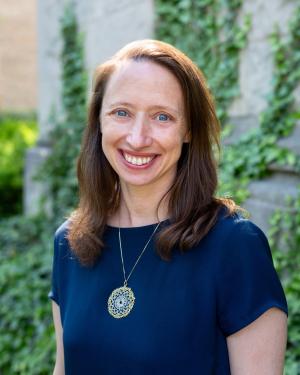
University of Michigan, PhD '05
BIOGRAPHY
Tara Zahra's research focuses on the transnational history of modern Europe, migration, the family, nationalism, and humanitarianism. Her latest book, Against the World: Anti-Globalism and Mass Politics Between the World Wars will be published by W.W. Norton Press in 2023. With Pieter Judson, she is currently working on a history of the First World War in the Habsburg Empire. Zahra is also the author of The Great Departure: Mass Migration and the Making of the Free World (Norton, 2016) and, with Leora Auslander, Objects of War: The Material Culture of Conflict and Displacement (Cornell, 2018). Her previous books include The Lost Children: Reconstructing Europe's Families after World War II (Harvard, 2011) and Kidnapped Souls: National Indifference and the Battle for Children in the Bohemian Lands (Cornell, 2008).
Graduate Advising
I welcome applications from graduate students interested in Central European history (including Habsburg, East European, and German history) in the nineteenth and twentieth centuries, as well as European international history and transnational history. Some of my current and former PhD students have worked on the history of gender and sexuality in late Imperial Vienna; migration and the family in postwar West Germany; the body in late Socialist Czechoslovakia; Jewish culture in postwar Czechoslovakia and Poland, Roma in postwar Hungary; colonialism and empire in Poland and Germany; and masculinity and coal mining in Socialist Czechoslovakia.
Recent Course Offerings
Undergraduate
-
Writing Family History (junior colloquium)
-
Human Rights in World Civilization
-
Twentieth-Century Europe
-
History of Human Rights (in Vienna)
-
East Central Europe in the Twentieth Century
-
Nazism (junior colloquium)
-
European Civilization I & II
-
Gender & Sexuality in World Civilization
-
Migration and Displacement in Twentieth-Century Europe
Graduate
-
History and Anthropology of the Present (with Susan Gal)
-
Seminar: Globalization and Its Discontents (with Jon Levy)
-
Transnational Europe: Twentieth Century
-
Nations & Empires (with Susan Gal)
-
Nationalism in East Central Europe
-
Unsettled Europe: Migration and Displacement in Modern Europe
-
Gender and Sexuality in Modern Europe (with Leora Auslander)
-
Historiography (with Emily Osborn)
-
Migration and Material Culture in Modern Europe (with Leora Auslander)
University and Departmental Service
-
Roman Family Director, Neubauer Collegium for Culture and Society
-
Faculty Sponsor of Transnational Approaches to Modern Europe Workshop
-
Executive Board, Center for Russian, East European, and Eurasian Studies
-
Faculty Affiliate, Center for Study of Gender and Sexuality
-
Editorial Board, Past & Present
Recent Research / Recent Publications
Against the World: Anti-Globalism and Mass Politics Between the World Wars. New York: W.W. Norton, 2023.
Coauthored with Pieter Judson, The Great War and the Transformation of Habsburg Central Europe. Oxford & New York: Oxford University Press, in progress.
Coauthored with Leora Auslander. Objects of War: The Material Culture of Conflict and Displacement. Ithaca, NY: Cornell University Press, 2018.
The Great Departure: Mass Migration from Eastern Europe and the Making of the Free World. New York: W.W. Norton, 2016.
- Review by Benjamin Cunningham in the Los Angeles Review of Books (May 24, 2016)
- Review by The Economist (April 30, 2016)
- Interview with Adam Morgan for the Chicago Review of Books (April 7, 2016)
- Review by Julie M. Klein in the Chicago Tribune (March 17, 2016)
The Lost Children: Reconstructing Europe's Families after World War II. Cambridge, MA: Harvard University Press, 2011.
- George Louis Beer Prize, American Historical Association, 2012
- Radomir Luza Prize, Austrian Cultural Forum, 2012
Kidnapped Souls: National Indifference and the Battle for Children in the Bohemian Lands, 1900–1948. Ithaca, NY: Cornell University Press, 2008; paperback, 2011.
- Book Prize, Czechoslovak Studies Association, 2009
- Barbara Jelavich Book Prize, American Association for the Advancement of Slavic Studies, 2009
- Hans Rosenberg Book Prize, Conference Group for Central European History, 2009.
- Book Prize, Austrian Cultural Forum, 2008-2009
- Laura Shannon Prize, Nanovic Institute, 2008–2009
- “Migration, Mobility, and the Making of a Global Europe,” Contemporary European History 31 (February 2022), 142-54.
- “Against the World: The Collapse of Empire and the Deglobalization of Interwar Austria,” Austrian History Yearbook 52 (2021)
- “Fin d’empire et genre de la déglobalisation,” Clio. Femmes, genre, histoire 53, 2021.
- "'Condemned to Rootlessness and Unable to Budge': Roma, Migration Panics, and Internment in the Habsburg Empire." American Historical Review 122, no. 3 (Jun. 2017).
- "Europe's Shifting Borders." Foreign Affairs (Feb. 11, 2017).
- "Travel Agents on Trial: Policing Mobility in Late Imperial Austria." Past & Present 223 (May 2014): 161–93.
- "Forum: Habsburg History." German History 31 (Jun. 2013): 225–38.
- With Pieter M. Judson. "Introduction." Austrian History Yearbook 43 (2012): 21–27.
- [Papers from the May 2008 symposium, "Indiference to Nation in Habsburg Central Europe."]
- "Going West." East European Politics and Societies 25 (Nov. 2011): 785–91.
- "'The Psychological Marshall Plan': Displacement, Gender, and Human Rights after World War II." Central European History 44 (Mar. 2011): 37–62.
- "Enfants et purification ethnique dans la Tchécoslovaquie d'après-guerre." Annales. Histoire, Sciences Sociales 66 (Apr.–Jun. 2011).
- "'A Human Treasure': Europe's Displaced Children Between Nationalism and Internationalism." Postwar Reconstruction in Europe: International Perspectives 1945–1949 Past & Present Supplement 6 (2011): 210.
- "Imagined Non-Communities: National Indifference as a Category of Analysis." Slavic Review 69 (Spr. 2010): 93–119.
- "'Prisoners of the Postwar': Expellees, Refugees, and Jews in Postwar Austria." Austrian History Yearbook 41 (2010): 191–215.
- "Lost Children: Displacement, Family, and Nation in Postwar Europe." Journal of Modern History 81 (Mar. 2009), 45–86.
- "The Minority Problem: National Classification in the French and Czechoslovak Borderlands." Contemporary European History 17 (May 2008): 137–165.
- "'Each Nation Only Cares for Its Own': Empire, Nation, and Child Welfare Activism in the Bohemian Lands, 1900–1918." American Historical Review 111 (Dec. 2006): 1378–1402.
- "Looking East: East Central European 'Borderlands' in German History and Historiography." History Compass 3, no. 1 (2005): 1–23.
- "Reclaiming Children for the Nation: Germanization, National Ascription, and Democracy in the Bohemian Lands, 1900–1945." Central European History 37 (Dec. 2004): 499–541.
- Writes an opinion piece "Globalization Is Collapsing. Brace Yourselves" for the New York Times (2025)
- Reviews of Against the World: Anti-Globalism and Mass Politics Between the World Wars in The New York Times and The Wall Street Journal.
- Receives Guggenheim Fellowship (2021)
- Delivers the Center for Austrian Studies' 36th Annual Kann Memorial Lecture (2020)
- "The Ugly U.S. History of Separating Famiies Goes Back Way Beyond Trump" in the Daily Beast
- Elected to the American Academy of Arts & Sciences
- Discusses "Europe's Shifting Borders" in Foreign Affairs
- Reviews of The Great Departure in the Chicago Tribune, the Economist, and the Los Angeles Review of Books
- Publishes The Great Departure: Mass Migration from Eastern Europe and the Making of the Free World (Norton, 2016)
- Writes an opinion piece, "America, the Not So Promised Land," for the New York Times
- Coorganizes "People & Things on the Move" conference, Neubauer Collegium
- Coorganizes "Human Trafficking, Labor Migration, and Migration Control in Comparative Historical Perspective" conference, Pozen Family Center for Human Rights
- Awarded 2014 MacArthur Fellowship
- Discusses "Humanitarianism and Displaced Children in Twentieth-Century Europe" [video, 66 minutes]
- Delivers lecture at Shannon Prize Award ceremony [video, 85 minutes]
- Writes on topics related to The Lost Children:Reconstructing Europe’s Families After World War II on The Nation

New York University, PhD '15
BIOGRAPHY
I am a scholar of the modern Middle East specializing in the historical geography of global capitalism, comparative studies of colonialism and empire, and environmental history.
Over the past decade of research and teaching, my overarching concern has been to address, simultaneously, two related challenges. First, as a historian of the postcolonial world, I am to pursue and develop new approaches to the critical study of global capitalism that demonstrate the continued relevance of insights and concerns that have animated the long and varied tradition of political economy. But second, drawing directly on the critiques of Eurocentrism and economic determinism that have been so central to the project of postcolonial studies, I seed to produce and teach historical narratives that unsettle the longstanding tendency to treat the “rest of the world” as mere passive recipients of ideas and processes that originate elsewhere.
My first book project, Egypt’s Occupation: Colonial Economism and the Crises of Capitalism (Stanford University Press, 2020) explores both the political economy of the Egyptian state and the role of political-economic thought in the struggle over British rule in Egypt following the occupation of 1882. For decades, Egypt has stood as a paradigmatic case of peripheral development in the capitalist world economy. From this perspective, the advent of Britain’s “veiled protectorate” after 1882 simply reinforced Egypt’s prior status as a vast plantation for the production of raw cotton and a market for industrial goods from Europe. All but obscured in such accounts is Egypt’s emergence as a key site for investment and experimentation in the worldwide financial expansion that characterized global capitalism at the close of the nineteenth century. Egypt’s Occupation tells the story of that financial boom and the crisis that followed. And the book goes on to demonstrate that this long-neglected process of financialization was of central importance to the politics of British rule. Across the four decades from the invasion of 1882 to Britain’s unilateral declaration of Egyptian independence in 1922, Egypt’s Occupation traces the complex career of the discourse I refer to as “colonial economism.” From the outset, British officials held that Egyptians, as racially distinctive human subjects, were capable of no more and no less than a bare recognition of their immediate material interests; the legitimacy of imperial rule would, accordingly, vary as a direct function of the “economic development” that British reform could deliver. In grappling with a discourse of colonial improvement that appeared to be succeeding on its own terms, Egypt’s early nationalist thinkers elaborated their own alternative accounts of the ephemeral and uneven qualities of financialization. They thereby articulated a range of rigorous, if fragmentary, critiques of the political and economic theories upon which the British had built their project of rule. In time, these efforts to find grounds for national sovereignty beyond the mere calculus of economic gain and lost shaped both the conceptual apparatus and the political strategies through which a growing nationalist movement sought to bring the occupation to an end.
Over the past few years, I have begun work on a new project, tentatively entitled Tilted Waters: The World the Suez Canal Made. Spanning more than two centuries, from the earliest European proposals to excavate a channel through the Isthmus of Suez to the Egyptian military regime’s current efforts to remake the waterway and its environs into a major processing hub and free trade zone, the book will explore the many and shifting roles that the Suez Canal has played in the production of global inequalities.
Before joining the Department of History, I was assistant professor of historical studies at The New School in New York City. I have also held fellowships at Yale University’s Program in Agrarian Studies and George Washington University’s Institute for Middle East Studies.
Recent Research / Recent Publications
-
“Peaceful Wars and Unlikely Unions: The Azhar Strike of 1909 and the Political of Comparison in Egypt,” Comparative Studies of Society and History (2022): 1-26.
-
Coauthored with Ahmad Shokr, “Capitalism in Egypt, Not Egyptian Capitalism,” in Joel Beinin, Bassam Haddad, and Sherene Seikaly, eds., A Critical Political Economy of the Middle East and North Africa (Stanford: Stanford University Press, 2020): pp. 123-142.
-
Egypt’s Occupation: Colonial Economism and the Crises of Capitalism (Stanford: Stanford University Press, 2020).
-
Coauthored with Ahmad Shokr, "Finding Value in Empire of Cotton," Critical Historical Studies Vol. 4, No. 1 (Spring 2017): 107-136.
-
"Review: John Chalcraft, Popular Politics in the Making of the Modern Middle East (Cambridge: Cambridge University Press, 2016)," Middle East Journal Volume 70, No. 4 (Autumn 2016): 688-691.
-
“Boom, Bugs, Bust: Egypt's Ecology of Interest, 1882-1914,” Antipode (February 2016).
-
“Review Essay: A New Materialism? Globalization and Technology in the Age of Empire,” International Journal of Middle East Studies Vol. 47, No. 2 (April 2015): 369-381.
-
“The Scales of Public Utility: Agricultural Roads and State Space in the Era of the British Occupation,” in Marilyn Booth and Anthony Gorman, eds., The Long 1890s in Egypt (Edinburgh: University of Edinburgh Press, 2014): 57-86.
-
“Review: Raouf Abbas & Assem El-Dessouky, The Large Landowning Class and the Peasantry in Egypt, 1837-1952, Amer Mohsen with Mona Zirki trans., (Syracuse: Syracuse University Press, 2012)," Economic History Review, 66, 2 (2013): 676-8.
-
“Review Essay: The Invisible State,” Arab Studies Journal Vol. XX, No. 1(Spring 2012): 236-245
-
“Review: Michael Ezekiel Gasper, The Power of Representation: Publics, Peasants, and Islam in Egypt (2009),” Arab Studies Journal Vol. XVIII, No. 1 (Spring 2010): 374-8.
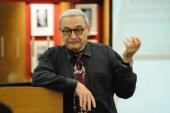
Prof. Hevia has retired and no longer directs BA theses or accepts new graduate students.
University of Chicago, PhD '86
BIOGRAPHY
James Hevia's research has focused on empire and imperialism in eastern and central Asia. Primarily dealing with the British Empire in India and southeast Asia and the Qing empire in China, the specific concerns have been with the causes and justifications for conflict; how empire in Asia became normalized within Europe through markets, exhibitions, and various forms of public media; and how the events of the nineteenth century are remembered in contemporary China. Both Cherishing Men from Afar (1995) and English Lessons (2003) focus on these issues. Subsequent research has centered on how the British in India developed and became dependent upon the production of useful knowledge about populations, geography, and pack animals to maintain their Asian empire. The first part of this project deals with military intelligence and appears in The Imperial Security State (2012). The second part of the project addresses military logistics, the uses of pack animals in warfare, the emergence of tropical veterinary medicine, and the physical transformation of the Punjab as a resource for supporting a security regime in northwest India. These subjects are taken up in Animal Labor & Colonial Warfare (2018). The third part of the project, now underway, considers the impact on India of new agricultural sciences that emerged at the end of the nineteenth century in Europe and the United States. Imperial Pests will focus attention on applied or economic botany and entomology and demonstrate how “constructive colonialism” in India situated imperial development projects in a global scientific network. It will specifically address the war on insect and weed “pests” and the long-term ecological impact on post-colonial nations-states in South Asia.
Recent Research / Recent Publications
Animal Labor & Colonial Warfare. Chicago: University of Chicago Press, 2018.
The Imperial Security State: British Colonial Knowledge and Empire-building in Asia. Cambridge: Cambridge University Press, 2012.
Yingguode Keye: Shijiu Shiji Zhongguo de Diguo Zhuyi Jiaocheng (English Lessons). Translated by Liu Tianlu. Beijing: Shehui kexue wenxian chubanshe, 2007.
English Lessons: The Pedagogy of Imperialism in Nineteenth-Century China. Durham, NC: Duke University Press and Hong Kong University Press, 2003.
Cherishing Men from Afar: Qing Guest Ritual and the Macartney Embassy of 1793. Durham, NC: Duke University Press, 1995. Chinese translation: Huairou yuanren. Beijing: Social Sciences Publishing House, 2002.
- Winner of the 1997 Joseph R. Levenson Book Prize, Association for Asian Studies.
"Tribute, Asymmetry, and Imperial Formations: Rethinking Relations of Power
in East Asia." In Past and Present in China's Foreign Policy, edited by John E. Wills. Portland, MN: Merwin Asia, 2011.
"Small Wars and Counterinsurgency." In Anthropology and Global Counterinsurgency, edited by John D. Kelly et al., 169–177. Chicago: University of Chicago Press, 2010.
"Tribute, Asymmetry, and Imperial Formations: Rethinking Relations of Power
in East Asia." Journal of American-East Asian Relations, special edition, From "Tribute System" to "Peaceful Rise": American Historians, Political Scientists, and Policy Analysts Discuss China's Foreign Relations 16, no. 1–2 (Spring–Summer 2009): 69–83.
"'The ultimate gesture of deference and debasement': Kowtowing in China." The Politics of Gesture: Historical Perspectives 203 (2009): 212–234.
"The Photography Complex: Exposing Boxer China, Making Civilization (1900–1901)." In Photographies East: The Camera and its Histories in East and Southeast Asia, edited by Rosalind Morris, 79–119. Durham, NC: Duke University Press, 2009.
"Plunder, Markets, and Museums: The Biographies of Chinese Imperial
Objects in Europe and North America." In What’s the Use of Art? Asian Visual and Material Culture in Context, edited by Morgan Pitlka, 29–141. Honolulu: University of Hawai’i Press, 2007.
"Rulership and Tibetan Buddhism in Eighteenth-Century China: Qing Emperors, Lamas and Audience Rituals." In Medieval and Early Modern Rituals: Formalized Behavior in the East and West, edited by Joelle Rollo-Koster, 279–302 Leiden: E.J. Brill, 2002.
"World Heritage, National Culture, and the Restoration of Chengde." Positions 9, no. 1 (2001): 219–244.
"Looting Beijing, 1860, 1900." In Tokens of Exchange, edited by Lydia Liu, 192–213. Durham NC: Duke University Press, 1999.
"The Archive State and the Fear of Pollution: From the Opium Wars to Fu-Manchu." Cultural Studies 12, no. 2 (1998): 234–264.
"Leaving a Brand on China." In Formations of Colonial Modernity in East Asia, edited by Tani E. Barlow, 113–140. Durham, NC: Duke University Press, 1997.
"Imperial Guest Ritual: A Translation and Introductory Comments." In Religions of China, edited by Donald Lopez, 471–487. Princeton, NJ: Princeton University Press, 1996.
"An Imperial Nomad and the Great Game: Thomas Francis Wade in China." Late Imperial China 16, no. 2 (1995): 1–22.
-
Named a 2015–16 National Humanities Center Fellow
-
Discusses "The Afterlives of Ruins: The Yuanmingyuan in China and the West" at the University of Chicago Center in Beijing [video, 66 minutes]
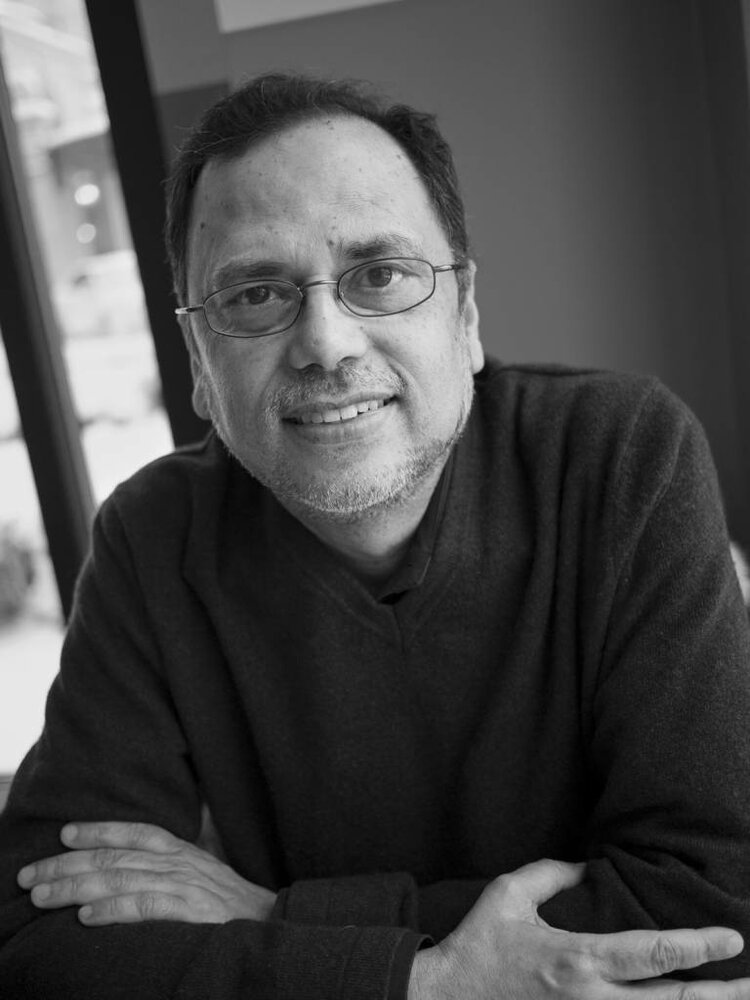
Affiliated Faculty, Department of English
Courtesy Appointment, Law School
Faculty Fellow, Chicago Center for Contemporary Theory
Visiting Distinguished Professor, School of Culture, History, and Language, The Australian National University, Canberra
Australian National University, PhD ' 84
BIOGRAPHY
Dipesh Chakrabarty holds a BSc (physics honors) degree from Presidency College, University of Calcutta, a postgraduate Diploma in management (considered equivalent to MBA) from the Indian Institute of Management, Calcutta, and a PhD (history) from the Australian National University. He is currently the Lawrence A. Kimpton Distinguished Service Professor in History, South Asian Languages and Civilizations, and the College. He is a faculty fellow of the Chicago Center for Contemporary Theory and, by courtesy, a faculty member in the Law School.
He is a founding member of the editorial collective of Subaltern Studies, a consulting editor of Critical Inquiry, and a founding editor of Postcolonial Studies. He has also served on the editorial boards of the American Historical Review and Public Culture.
Honors and Awards (Selected)
- Awarded the Prix Européen de l’Essai or the European Essay Prize for Après le changement climatique: penser l’histoire (Paris: Gallimard, 2023), the French translation of The Climate of History in a Planetary Age (2021)
- DLitt. (Honoris Causa), University of London (conferred at Goldsmiths), 2010
- Honorary doctorate, University of Antwerp, Belgium, 2011
- Honorary doctorate, École Normale Supérieure, 2021
- Toynbee Foundation Prize, for contributions to global history, 2014
- Tagore Memorial Prize, Government of West Bengal, 2019, for The Crises of Civilization (2018)
- Jadunath Sarkar Memorial Gold Medal, Asiatic Society of Bengal, Kolkata, 2021 for contribution to History
- Fellow, American Academy of Arts & Sciences
- Honorary Fellow, Australian Academy of the Humanities
- Fellow, British Academy
Fellowships and Visiting Professorships (Selected)
- Visiting Fellow, Max Planck Institute for Historical Sciences, 2005
- American Institute of Indian Studies Senior Fellowship, 2005–6
- Honorary Professorial Fellow, School of Historical Studies, University of Melbourne, 2007–2011
- Fellow, Wissenschaftskolleg, Berlin, 2008–9
- Fellow, Institute of Human Sciences (IWM), Vienna, 2010
- Hallsworth Visiting Professor, University of Manchester, 2010
- Dean’s Distinguished Visitor, College of Asia and Pacific, Australian National University, 2015–2027
- Visiting Professor, École Normale Supérieure, Paris, 2019
- Visiting Professor, The University of Technology, Sydney, Australia (to present)
Research Supervision
Chakrabarty’s current students in History and SALC work on a variety of topics: 20th-century Kerala, prostitution in British India, India-China relations in the 1950s, modern Islam in Bangladeshi history, youth culture in colonial Bengal, the history of modern Bengali music, state-making and representations of royalty in Nepal, the labor history of Bombay, and the energy history of Maharashtra.
Recently completed theses include work on epidemics in the British Empire, the history of the Sino-Indian boundary, the history of the idea of “popular sovereignty” in colonial India, Yunani medicine, the politics of water in Pakistan, India reform societies in nineteenth-century Britain, slavery in south India, environmental consciousness in Hindi literature, the East India Company in the eighteenth century, the Vaishnava movement in nineteenth-century Bengal, the history of the film industry in Bengal, the history of housing in Bombay in the early part of the twentieth century, comparative indigenous histories of Australia, Canada, and New Zealand, the culture-concept in Bengali history, visual aspects of the rebellion of 1857, the making of the Indian constitution, the sixties in Pakistan, low-caste politics in Bengal during the Partition, Assam tea-plantations, missionaries in Orissa, religious thought among Bengali Muslims in the nineteenth and early twentieth centuries, mass politics in Bangladesh, labor in Delhi, the history of the Anglo-Indian communities in India, the history of photo-journalism in Bengal, the evolution of the qazi and mufti in British India, and the intellectual history of Mughal India.
Recent Research / Recent Publications
- Rethinking Working-Class History: Bengal 1890–1940 (Princeton, 1989; 2000)
- Provincializing Europe: Postcolonial Thought and Historical Difference (Princeton, 2000; second edition, 2008) – translated into Italian, Spanish, French, Polish, Turkish, Korean, and Russian
- Habitations of Modernity: Essays in the Wake of Subaltern Studies (Chicago, 2002) – translated into Arabic (Kalima, 2011)
- The Calling of History: Sir Jadunath Sarkar and His Empire of Truth, c. 1900–1950 (Chicago, 2015)
- The Crises of Civilization: Exploring Global and Planetary Histories (Delhi: Oxford, 2018) with Ranajit Dasgupta, Some Aspects of Labour History of Bengal in the Nineteenth Century: Two Views (Delhi: Oxford, 2019) – translated into Bengali
- The Climate of History in a Planetary Age (Chicago, 2021; New Delhi: Primus, 2021) – Translated into German, Spanish, and French with Portuguese, Korean, and Chinese translations forthcoming
- One Planet, Many Worlds: The Climate Parallax (Brandeis, 2023) – Korean translation forthcoming
- Lectures in the Human Sciences, Institute for the Human Sciences (IWM), Vienna, 2014
- Radhakrishnan Memorial Lectures at All Souls’ College, Oxford, 2014
- Tanner Lectures in Human Values, Yale, 2015
- Mandel lectures in the Humanities, Brandeis, 2017
- History and Theory annual lecture, Harvard, 2017
- inaugural Halle Lectures in the Humanities, Halle, 2018
- William James Lecture, Harvard Divinity School, 2019
- Sixth Annual Ikeda Lecture on Peace and Harmony, Singapore Management University, Singapore, 2020
- inaugural Contributions to Indian Sociology Lecture, Indian Institute of Economic Growth, Delhi, 2021
- Golden Jubilee lecture, Centre for Studies in Social Sciences, Kolkata, 2023
- What We Have in Common in this Fragmented World,” General Conference, UNESCO, 2023
- keynote, European Congress of Theology, Heidelberg, 2024
- Smuts Memorial Lectures, University of Cambridge, March 2025
- with Shahid Amin, Subaltern Studies IX (Delhi: Oxford, 1996)
- with Carol Breckenridge, Homi Bhabha, and Sheldon Pollock, Cosmopolitanism (Duke, 2000)
- with Rochona Majumdar and Andrew Sartori, From the Colonial to the Postcolonial: India and Pakistan in Transition (Delhi: Oxford, 2007)
- with Bain Attwood and Claudio Lomnitz, “The Public Life of History,” a special issue of Public Culture (2008)
- with Henning Trueper and Sanjay Subrahmanyam, Historical Teleologies in the Modern World (Bloomsbury, 2015)
- Itihasher janajibon o anyanyo probondho [The Public Life of History and Other Essays] (Kolkata: Ananda, 2011)
- Monorather Thikana [Where the Mind Travels], ed. Sanjib Mukhopadhyay (Kolkata: Anustup, 2018) – Shortlisted for the Ananda literary prize in Calcutta in 2019
- Bondhur chithi Bondhuke [Letters Between Friends] (Kolkata: Anustup, 2019) – correspondence between Dipesh Chakrabarty and the deceased Bengali writer Raghab Bandyopadhyay, 2003–2016
- Smriti, Satta, Songlap [Memories, Identities, and Conversations] (Calcutta: Nirjhor Publications, 2023)
- “The Climate History: Four Theses,” Critical Inquiry (Winter 2009): 197–222. Translated as “Le Climat de L'Histoire: Quatre Theses.” La Revue Internationale 5 (January-February 2010): 22–31. Also carried in Eurozine (October 30, 2009), and translated into German, Spanish, Hungarian, Malayalam, Korean, and Chinese.
- “From Civilization to Globalization: The West as a Signifier in Indian Modernity,” Inter–Asian Cultural Studies 13, no. 1 (2012). French translation published in La Revue des Libres (January 31, 2012).
- “Postcolonial Studies and the Challenge of Climate Change,” New Literary History 43, no. 1 (Winter 2012): 1–18.
- “Friendships in the Shadow of Empire: Rabindranath Tagore’s Reception in Chicago, c. 1913–1932,” Modern Asian Studies 48, no. 5 (September 2014): 1161–1187.
- “Climate and Capital: On Conjoined Histories,” Critical Inquiry (Fall 2014): 1–23.
- “The Human Significance of the Anthropocene,” in Reset Modernity! ed. Bruno Latour (Cambridge, MA: MIT Press, 2016).
- “The Politics of Climate Change Is More Than the Politics of Capitalism,” Theory, Culture, & Society 34, nos. 2-3 (March-May 2017): 25–37.
- “Between World History and Earth History: Anthropocene Time,” History and Theory (March 2018): 5–32.
- “The Planet: An Emergent Humanist Category,” Critical Inquiry 46, no. 1 (Autumn 2019): 1–31.
- “The Human Sciences and Climate Change: A Crisis of Anthropocentrism,” Science and Culture 86, nos. 1–2 (January–February, 2020): 46–8.
- with Bruno Latour, “Conflicts of Planetary Proportions – A Conversation,” Journal of the Philosophy of History 14 (2020): 419-454.
- “Planetary Humanities: Straddling the Postcolonial/Decolonial Divide,” Daedalus 151, no.3 (Summer 2022): 222-233.
- Saurabh Dube, Ajay Skaria, and Sanjay Seth, eds., Dipesh Chakrabarty and the Global South: Subaltern Studies, Postcolonial Perspectives, and the Anthropocene (Routledge, 2020)
- special issue, Práticas da História, No. 11 (2020), marking the twentieth year since the publication of Provincializing Europe
- Ahmed Kamal, ed., Somoyer Kuyashay [In the Mists of TIme] (Dhaka: University Press, 2023)
“Tagore in Our Times and His” (Inaugural Lecture, The Tagore Program, University of California, Berkeley, February 22, 2020)
“The Planet: An Emergent Matter of Spiritual Concern?” (William James Lecture, Harvard Divinity School, May 1, 2019)
The Fifth Annual Mandel Lectures in the Humanities (Brandeis University, March 13, 14, and 16, 2017)
“Talk on Climate Change and the Humanities” (talk presented at Centre for Policy Research, New Delhi, March 1, 2016)
Tanner Lectures on Human Values (Yale University, February 18–20, 2015)
- Lecture 1: “Climate Change as Epochal Consciousness”
- Lecture 2: “Decentering the Human? Gaia”
- Roundtable: “The Human Condition in the Anthropocene: Roundtable Discussion”
“Rethinking Working Class: Postcolonial Perspectives on a Revolutionary Concept” (Rosa-Luxemburg-Stiftung, October 29, 2014)
30 Years of Elementary Aspects of Peasant Insurgency in Colonial India, Centre for the Study of Developing Societies, Feb. 13, 2013
The Anthropocene Project: An Opening, Haus der Kulturen der Welt, Berlin, Jan. 10–13, 2013
“The Calling of History: Sir Jadunath Sarkar and the Birth of Historical Research in India” (paper presented at the annual B.N. Ganguli Memorial Lecture series at the Centre for the Study of Developing Societies, Delhi, India, October 30, 2012)
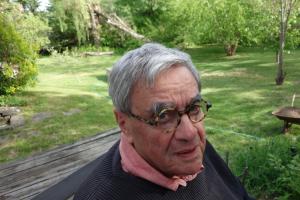
Prof. Harootunian has retired and no longer directs BA theses or accepts new graduate students.
University of Michigan, PhD '58
